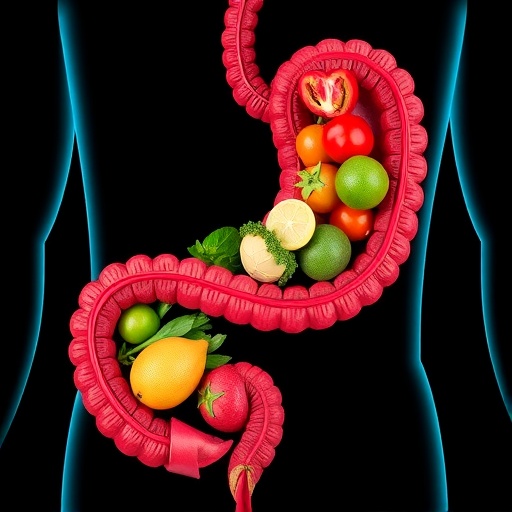In a groundbreaking advancement for rectal cancer treatment, researchers have unveiled a novel prognostic approach that blends inflammatory and nutritional biomarkers to predict patient outcomes more accurately following neoadjuvant chemoradiotherapy (nCRT). The study, led by Wang, M., Di, X., Zhang, S., and colleagues, delves into the intricate interplay between systemic inflammation, nutritional status, and tumor progression, highlighting powerful prognostic tools termed the modified Gustave Roussy Immune (mGRIm) score and the modified Naples Prognostic Score (M-NPS). These integrated scores provide critical insights into personalized treatment strategies, particularly the optimization of nCRT efficacy in rectal cancer patients.
Rectal cancer, a formidable global health challenge, often necessitates a multimodal approach, with nCRT preceding surgical resection being a cornerstone of curative intent. Yet, patient responses to this regimen show marked heterogeneity, complicating treatment planning and prognostication. The current study’s retrospective cohort analysis scrutinizes 157 patients who underwent nCRT, followed by total mesorectal excision and adjuvant chemotherapy, to interrogate the prognostic significance of integrated inflammatory and nutritional assessments.
Central to the study’s methodology is the calculation of two composite scores: the mGRIm and the M-NPS. The mGRIm score incorporates serum lactate dehydrogenase (LDH), albumin levels, and the neutrophil-to-lymphocyte ratio (NLR), parameters reflecting tumor metabolism, nutritional reserves, and systemic inflammation, respectively. Meanwhile, the M-NPS extends this paradigm by integrating albumin, total cholesterol, NLR, and the lymphocyte-to-monocyte ratio (LMR), capturing a broader spectrum of immunonutritional dynamics.
The researchers stratified patients into high- and low-risk groups according to these scores, enabling a nuanced analysis of overall survival (OS) and progression-free survival (PFS) outcomes. Statistical evaluations, including Kaplan–Meier curves and Cox proportional hazards models, illuminated significant correlations between elevated inflammatory-nutritional scores and poorer survival metrics. Specifically, patients with higher mGRIm and M-NPS exhibited markedly diminished OS and PFS, underscoring the prognostic weight of systemic inflammatory and nutritional disruptions in rectal cancer management.
Delving deeper, multivariate Cox regression analyses pinpointed critical independent predictors. Tumor length exceeding five centimeters, pre-radiotherapy distant metastases, and a high M-NPS robustly forecasted inferior OS. Conversely, a high mGRIm score, advanced nodal involvement (N stage), and metastatic disease portended decreased PFS. These findings not only validate the clinical relevance of the composite scores but also enhance risk stratification beyond conventional staging parameters.
Pioneeringly, the study culminated in the construction of a nomogram that synthesizes inflammatory-nutritional metrics with established clinical parameters to estimate individualized survival probabilities. This predictive model demonstrated commendable accuracy, with area under the receiver operating characteristic curve (AUC) values consistently surpassing 0.7 for 1-, 2-, and 3-year OS and PFS forecasts. Calibration curves concurrently affirmed the model’s predictive reliability, suggesting substantial utility in clinical decision-making.
From a mechanistic standpoint, the integration of inflammatory and nutritional indices reflects the reciprocal influence of tumor biology and host response. Elevated LDH levels indicate heightened tumor glycolysis and hypoxia, fostering aggressive phenotypes. Hypoalbuminemia and dyslipidemia signal malnutrition and systemic catabolism, which impair immune competence and treatment tolerance. The NLR and LMR encapsulate the balance between pro-tumor inflammatory cells and anti-tumor lymphocyte populations, modulating tumor microenvironment dynamics and systemic immunity.
This investigational endeavor underscores the imperative to transcend traditional oncological staging by embedding biomarker-driven frameworks into therapeutic algorithms. The capacity to preemptively gauge treatment response and survival not only individualizes care but also allocates resources efficiently, potentially sparing non-responders from unnecessary toxicities while guiding intensified surveillance.
Notably, the retrospective design and single-institution cohort represent limitations warranting multicenter prospective validation to consolidate generalizability. Further exploration into the biological underpinnings of these scores may also unravel novel therapeutic targets, particularly in modulating inflammation and nutritional pathways.
The fusion of inflammatory and nutritional evaluations represents a promising leap towards precision oncology in rectal cancer. By harnessing readily obtainable laboratory parameters, clinicians can now better predict outcomes, tailor neoadjuvant approaches, and refine patient counseling. Such innovations align with the broader oncology paradigm shift focusing on biomarker-informed personalized medicine.
As the field advances, integrating molecular profiling with composite immunonutritional scores could yield even more robust predictive models, facilitating dynamic treatment adjustments. Moreover, these insights may extend to other malignancies where host-tumor interactions critically influence prognosis, heralding a new era of integrative oncology.
In conclusion, Wang and colleagues provide compelling evidence that combined inflammatory-nutritional evaluation via mGRIm and M-NPS scores holds significant prognostic value in rectal cancer patients undergoing nCRT. The developed nomogram stands poised to become a vital clinical tool, augmenting individualized risk assessment and optimizing therapeutic outcomes. This study exemplifies the impactful convergence of biomarker research and clinical oncology, paving the way for more effective, patient-centered cancer care.
Subject of Research:
Rectal cancer prognosis and treatment response prediction using integrated inflammatory and nutritional biomarker scores in neoadjuvant chemoradiotherapy settings.
Article Title:
Prognostic value of integrated inflammatory-nutritional evaluation in neoadjuvant-treated rectal cancer: a retrospective cohort analysis.
Article References:
Wang, M., Di, X., Zhang, S. et al. Prognostic value of integrated inflammatory-nutritional evaluation in neoadjuvant-treated rectal cancer: a retrospective cohort analysis. BMC Cancer 25, 1453 (2025). https://doi.org/10.1186/s12885-025-14804-7
Image Credits: Scienmag.com
DOI: https://doi.org/10.1186/s12885-025-14804-7
Tags: Inflammatory-Nutritional Scoremodified Gustave Roussy Immune scoremodified Naples Prognostic Scoremultimodal cancer treatmentneoadjuvant chemoradiotherapynutritional status and tumor progressionpatient response heterogeneitypersonalized treatment strategiesprognostic biomarkersrectal cancer outcomesretrospective cohort analysissystemic inflammation in cancer





